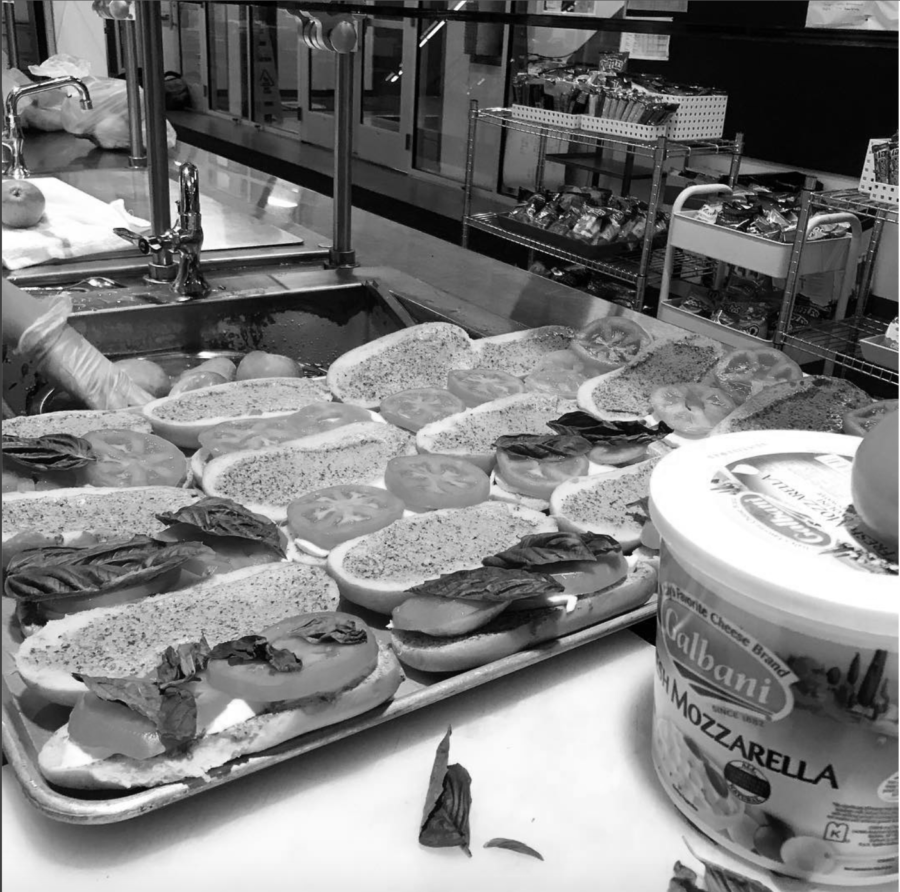Flik combines financial security with sustainable, small batch cooking
Sandwiches being prepared in the Flik kitchen in the Mark Salkind center. By Phoebe Grandi, Visuals Editor.
In the past four years, the Urban community has been served by three different food providers: Urban’s own cafeteria service, an outsourced company called Fare Resources and currently, Flik Independent School Dining. While Urban has finally arrived at Flik, the difficulty of maintaining a successful business model through combining sustainable and organic food with affordable prices persists.
Fare Resources focused on providing Urban with sustainable and locally sourced options as well as living wages for their employees. The company struggled to maintain these goals and stay affordable for students, and after the Fall trimester of 2016, Urban’s partnership with Fare ended. For the last two years, Urban has worked with Flik Independent School Dining to provide fresh, balanced and relatively low-cost meals. Flik Hospitality works under a larger hospitality and food company called Compass Group USA which is the leading foodservice company in the country. Flik joined Compass Group in 1995.
Joining Urban with Flik last year, Chef David Labao brought his previous experience in corporate dining to the student community. Labao explained that he works off of a rough 6-week rotating menu, but leaves some days blank if he is inspired or if he finds a particular seasonal item he wants to highlight. He explained that he also really tries to develop balanced meals: “I build a plate, and the plate has protein, starch and vegetables and any kind of combination of these.”
Flik Hospitality has maintained many longstanding partnerships with independent schools and corporate offices. As a large corporation, Flik offers Labao and the other Flik employees many resources such as product sales and industry insights that Urban’s previous providers lacked. In terms of using organic products, Labao expressed the difficulties in balancing an affordable and completely organic kitchen. “When I can and it’s available and affordable, I buy organic, he said.” Labao continued, “Some of it’s local, some of it’s from the Central Valley and some of the berries and watermelon year round come from Mexico.”
Being a part of a company like Flik also dictates the way that Labao runs his kitchen and the products that he serves. To balance healthy food with affordable prices, Labao says that Flik gets a lot of their funding from deals or partnerships with big corporations like Pepsi and Coca-Cola. Labao explained that Urban has limited students’ access to products like Coca-Cola and other junk foods, but “these companies own Naked Juice and they own Izze,” both products Flik serves at Urban. He added that, “a lot of our financial stability is from ordering case after case after case [of these juices].” Labao clarified saying, “don’t take it that we’re using Sysco s*** in a box.” After all, he explained that “small batch fresh cooking” is Flik’s ultimate mission.
Under Compass Group USA, Flik follows various sustainability goals that work to limit its environmental footprint. Compass Group and companies under it, like Flik, follow “Sustainable Development Goals” that were laid out by the United Nations in 2015. These goals help large corporations like Compass Group and smaller companies like Flik Hospitality make purposeful choices in their use of local, sustainable and organic food.
One of Compass Group’s goals is to “end hunger, achieve food security and improved nutrition and promote sustainable agriculture,” according to the company’s website. For Compass, this goal is carried out through using “imperfect produce” that would otherwise be wasted, while for Flik, Chef David highlights seasonal and local product in his meals to carry out this goal.
Compass is also working to “ensure healthy lives and promote wellbeing for all at all ages.” David’s approach to creating nutritious but approachable food is clear in the Urban community’s love of his food.
These two goals are examples of the wider effort that Flik and Compass are making to make sustainable and healthy food the norm in a wide range of settings.
Labao added, “could we be 100% local? Sure, if we had a bunch more money.”
Despite financial limitations, Flik and Compass Group continue as leaders in bringing sustainable and healthy food to school and corporate communities.












